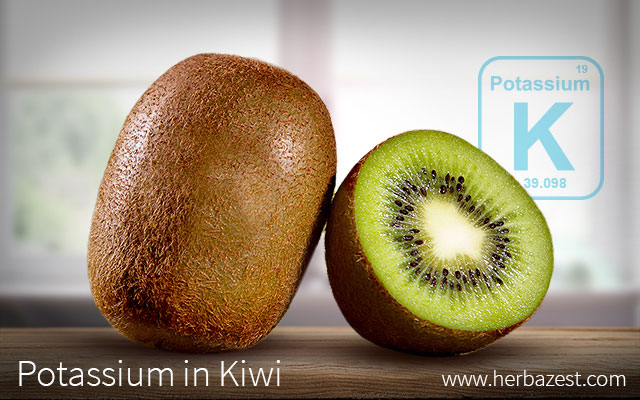The potassium in kiwi helps the heart, nerves, and muscles work and therefore is a major beneficial nutrient when consumed in appropriate doses, as too much potassium can lead to side effects. When it comes to kiwi nutrition, it is crucial to know how its vitamins and minerals can affect your body functions. Keep reading to learn the average kiwi potassium amount, and how important is this mineral for your health.
What is Potassium?
Potassium is an essential mineral necessary for the body to function normally. It helps with a number of vital tasks, including muscle contraction, fluid regulation in and out of cells, and maintaining a normal blood pressure by counteracting the adverse effects of sodium.
The Institute of Medicine of the National Academies of Science recommends at least 4,700 milligrams of potassium daily for the average adult. This number may seem very high, especially given that it is double what most people actually consume.
While potassium holds many beneficial aspects, high levels can be harmful with known adverse effects, such as irregular heartbeat. Monitoring potassium intake is the best way to avoid these side effects, though most people don't come close to reaching excessively high levels in their regular diets. Fruits and vegetables are considered high in potassium, so it is important to know which items have significantly high levels. This is especially important for people focusing on weight control, because many foods high in potassium are also high in calories.
Is Kiwi High in Potassium?
Kiwi is considered to be a high-potassium fruit, with 312 mg per 100 grams, only surpassed by banana, which provide 350 mg/100 g. Other fruits with notable potassium levels are cantaloupe melon, which offer 267 mg/100 g; and orange, with 196 mg/100 g.
Kiwi potassium amount is higher than most fruits, with the exception of banana.
Kiwi may rank in the middle as far as potassium and calories are concerned, but the benefit of kiwi consumption for potassium is the added bonus of rich vitamin intake. Kiwi is full of vitamins C (ascorbic acid) and E, both of which have antioxidant properties that aid in blood circulation, among many other individual benefits. Potassium can also be found in a wide range of foods, including leafy greens, such as kale, lettuce, and spinach, as well as in potato, tomato, pumpkin, eggplant, beans, meat, poultry, fish, and nuts.
While potassium in kiwi is a vital nutrient for helping the body to grow and sustain itself, high potassium intake can be dangerous. However, an excessive consumption of kiwi fruits would be necessary to reach harmful levels, and following the recommended daily amounts will lead to a safe and beneficial effects.
Sources
- Australian Government, Queensland Government, Controlling potassium (K +)
- Journal of the Academy of Nutrition and Dietetics, What is Potassium?
- USDA Nutrient Database, Kiwifruit, green, raw
- American Heart Association, Potassium




